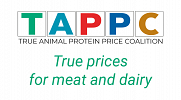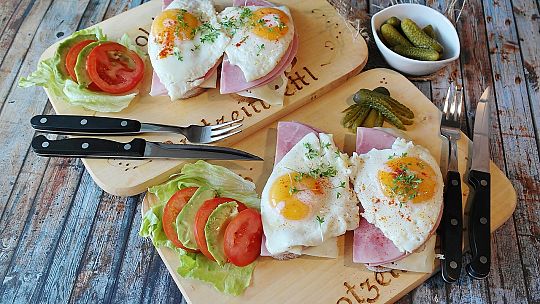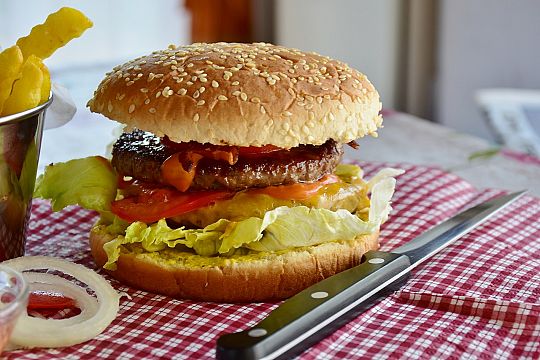FAO & World Bank urge countries to start meat taxes, subsidise veggies
Press release November 11, 2024 by TAPP Coalition
FAO & World Bank urge countries to start meat taxes, subsidise veggies
TAPP Coalition COP29 update on UN Member State frontrunners and laggards of food pricing climate policies
Today, TAPP Coalition gave comments on a new FAO report that urged countries to start taxing meat. This was done during an UNFCCC facilitated press conference at COP29, the Climate conference in Baku that started today. In its recorded press conference, TAPP Coalition also gave an update on frontrunners and laggards of UN countries relating to food pricing policies and dietary shifts. Laggards are the USA, Australia, Canada, the UK, runners up are countries like China and Germany, while frontrunners are Switserland, Denmark and the EU Commission. In Febraury 2025 all nations have to update their policy plans on agriculture, food and climate (NDCs). There is a huge gap between what countries do, what they committed during last COP28 and what is needed to realise the climate goals in food systems, according to FAO and World Bank.
Last Friday, 9th November, 2024, just before the start of the UN Climate Conference in Baku on Monday, the FAO has published a groundbraking report on the external costs of food chains: the SOFA 2024 report (State of Food and Agriculture). These external costs, or 'hidden costs', are those not reflected in food prices but which result in significant societal expenses, such as impacts on health, climate, and biodiversity. FAO recommends countries to start taxes on meat and dairy and give subsidies for vegetables and fruit, to reduce external food costs. Taxing meat and subsidising healthy food is also in line with previous recommendations last May from the World Bank.
The World Bank report 'Recipee for a Livable Planet' recommended similar taxes on 'high emitting food' in high income countries and medium income countries. Four African Ministers and over 150 NGO's now urge OECD countries and China to start GHG emission taxes on meat to reduce emissions. Based on FAO and World Bank recommendations to start meat taxes, a COP29 Declaration now can be signed by Ministers, organisations (e.g. FAO) and non profits. TAPP Coalition urged the global livestock and meat sector to cooperate in developing higher meat pricing policies that also can benefit farmers and the sector. Tax revenues can contribute partly to the Loss & Damage Fund.
According to last year's FAO SOFA 2023 report, the external costs of global food systems amount to $10 trillion annually [2] — a multiple of what consumers pay at checkout and 10 percent of global GDP. The majority of these costs stem from health impacts, primarily due to food lacking in essential nutrients and the rising prevalence of obesity. However, companies — and by extension, their shareholders—are not held accountable for the environmental and health damages they cause. On the stock market, companies are not penalized for their societal impacts. The FAO now advises governments to integrate these external costs into food prices, for example through taxes, while ensuring compensation for low-income groups.
The FAO report published last Friday also highlights contributions made by the Dutch TAPP Coalition and Transition Coalition Food last winter, regarding the hidden costs of food systems. Among the examples cited in the FAO SOFA 2024 report is a 'true price' catering project by TAPP Coalition and Greendish at universities, which introduced true pricing for meat, making healthier food more affordable. Another example is the successful 'True Cost Week' by German supermarket Penny, which applied true pricing to meat and dairy. One of the reports of the TAPP Coalition submission was a report by CE Delft, showing external costs of dairy and meat can be substantial, ranging between the € 0.34 for a litre of milk to over € 10 per kg of beef. TAPP Coalition also submitted a report by Wageningen University and True Price on external social health costs of overconsumption of red and processed meat in the Netherlands. If such health costs should be included in a kg of red meat, the price would go up with 7,5 euro per kg red meat! This report was inspired by the report ‘Health motivated taxes on meat’, (Oxford University), showing optimal meat tax levels benefiting health and reducing health costs in 149 countries.
For the Netherlands, these external costs are estimated at over the incredible amount of $50 billion annually (see Annex 2). This figure includes additional costs from unhealthy diets, the impact of food chains on greenhouse gas emissions, and biodiversity loss. This means, (pricing) policies promoting healthier and more sustainable food would be very beneficial for the Dutch economy, as they can reduce billions in societal damages. Previous reports in the Netherlands calculed 9-10 billion euro or 28,75 billion euro annual environmental damage costs of the Dutch livestock sector, that generated 15 billion euro per year in net value. This means that environmental damage costs of the Dutch livestock sector are higher compared to the net value of the sector. Negative health impacts of meat overconsumption were calculated of 0,6 billion euro/year and other reports claimed 6 billion euro per year of negative health impacts of Dutch food consumption in general.
TAPP Coalition and Transitiecoalitie Voedsel have highlighted several Dutch studies demonstrating that incentives and pricing measures are effective tools for achieving climate goals. Specifically, taxes on meat and dairy are well-suited to reducing meat consumption. Moreover, an increasing number of studies show that lowering meat consumption also benefits public health.
The FAO report published today extensively explores the potential of using taxes to mitigate the hidden costs of food systems, urging countries and businesses to support such measures (see quotes).
-----
Not for publication:
News coverage about this press release:
Trend News Agency: https://en.trend.az/business/green-economy/3968029.html
IJR Independant Journal Review
News coverage on later press release Food & Climate Action Group
Nigerian Tribune Online: https://tribuneonlineng.com/cop29-deal-needed-to-transition-away-from-meat-overconsumption-group/
World Leaders Urged to Commit to Transitioning Away From Meat & Dairy at COP29 - vegconomist - the vegan business magazine
https://www.agri-pulse.com/articles/21918-what-anti-meat-activists-have-on-the-menu-at-cop29
https://table.media/en/climate/feature/food-transition-why-there-is-little-progress-at-cop29/
https://flood.house.gov/media/press-releases/congressman-flood-calls-biden-administration-fight-anti-meat-agenda-cop29
More information:
Jeroom Remmers 0031 622 40 7712 (True Animal Protein Price Coalition)
Phone: 0031 6 2240 7712
The recording of the TAPP Coalition press conference November 11, during the UN Climate Conference, to discuss the FAO SOFA 2024 report (3:00 PM - 3:30 PM AZT/UTC+4) can be found here.
This theme will also be addressed in other COP29 press conferences. More information can be found here.
For Publication:
Explicit quotes from the FAO report published today:
p.28: “Another promising lever that would not increase the fiscal burden, therefore, is to reform the current system of taxation to complement the repurposing of agricultural support. A recent study on the impacts of reforming the existing value added tax (VAT) mechanisms in Europe – considering that VAT accounts for over one-fifth of public revenues in the European Union – finds that aligning VAT rates with health and environmental objectives could decrease food-related GHG emissions, reduce the dietary risks associated with NCDs and increase tax revenues, while leaving the cost of a healthy food basket mostly unchanged. The modelled health improvements (that is, lower mortality and disease burden attributable to dietary and weight-related risk factors) are linked to cutting VAT rates on fruits and vegetables, whereas most environmental and revenue benefits are driven by increased VAT rates on meat and dairy. Using taxes in a way that does not discriminate among who bears the costs can inevitably be regressive (that is, have a disproportionate impact on poorer consumers); therefore, policy packages including such levers need to combine them with other health-related programmes to prevent disproportionate impacts on low-income households and children”.
p 59 “In addition to TCA, some businesses are experimenting with “true prices”, where the hidden costs of products are incorporated into transactions to improve transparency and decision-making.In the Kingdom of the Netherlands, the true price supermarket, De Aanzet, permanently charges true prices, fostering a positive bond between farmers and consumers. Similarly, the Van Vessem bakery uses true price information to demonstrate that its bread is twice as sustainable as the average bread. The goal of true pricing is to eliminate or reduce hidden costs as much as possible and ensure that affordable and healthy food is accessible to people, aligning with the right to food. By broadening its implementation, unsustainable products could become more expensive, while sustainable alternatives could become more affordable. This shift would encourage consumers and businesses alike to prioritize sustainability in their purchasing decisions”.
“The Food service industry is also experimenting with true pricing, particularly in the Kingdom of the Netherlands, where the canteen of the Ministry of Infrastructure and Water Management has piloted true pricing for 15 products. Vermaat, one of the country’s largest catering companies, has used true price information to adapt recipes, used remediation to improve the egg value chain, and now has true pricing in its Food Vision 2027. In partnership with Netherlands universities, it applied true prices to meat, increasing prices by an average of 40 percent, while vegetables, fruits and vegetarian meals became 9 percent cheaper. This resulted in greater customer satisfaction and people buying 20 percent less meat and seven times more vegetarian options, vegetables and fruits.
This demonstrates that companies’ interest in moving towards healthier, more sustainable and justly produced goods needs to be backed by financial investment. The next section explores how and why financial institutions are increasingly prioritizing activities that advance agrifood systems transformation”.
p.77 “A politically more feasible option could be to reform existing tax regimes. A recent paper found that a VAT reform to decrease taxes on fruits and vegetables and increase taxes on animal products would have the potential to address environmental and health hidden costs in Europe without affecting government revenue. True pricing initiatives to reflect the true cost of food in market prices act like a tax in principle,…
Overall, a combination of taxes and subsidies with other levers that aim to change diets directly, either through improved information to instigate behavioural change or through regulations to improve the nutrient profile of food during the production stage, is essential”.
Footnotes:
1) https://openknowledge.fao.org/items/5c02d590-5016-4cde-90f3-44619864d221
2) Hidden costs of global agrifood systems worth at least $10 trillion
3) https://www.fao.org/fsnforum/comment/12091
Annex 2:
SOFA 2024 report on Burden of Netherlands: TOTAL HIDDEN COSTS 50.631 billion per year
ENVIRONMENTAL Climate 3.346
Land 556
Nitrogen 7.860
Burden of disease 38.869
Total 50.631 bln USD /year
Annex 3: reports submitted for the FAO SOFA 2024 report by TAPP Coalition and Transition Coalition Food
Studies:
Value Case 2023. The societal impact of protein transition. Study by WUR (Wageningen University and Research), commissioned by TCV:
https://research.wur.nl/en/publications/maatschappelijke-impact-van-eiwittransitie
‘Eat as you pay dairy, eggs and meat’, 2023. Study by CE Delft commissioned by TAPP Coalition. https://cedelft.eu/publications/pay-as-you-eat-dairy-eggs-and-meat-internalising-external-costs-of-animal-food-products-in-france-germany-and-the-eu27/
‘Sustainability Charge on meat’, 2020. Study by CE Delft, commissioned by TAPP Coalition. https://cedelft.eu/publications/a-sustainability-charge-on-meat/
‘Consumer health -True pricing method for agri-food products’, 2022, Study by WUR (Wageningen University and Research) and True Price, commissioned by TAPP. Health costs of 7.5 euros per kg of red meat overconsumption - True Animal Protein Price Coalition (tappcoalition.eu)
“Rewarding and Pricing”. Rewarding and Pricing - Shifting Financial and Fiscal System Incentives from Farm to Fork TCV Study by Jan Paul van Soest and Tom Kools (Rapport-Belonen-en-Beprijzen-van-Boer-tot-Bord.pdf (transitiecoalitievoedsel.nl)
Joost de Jong, Jeroom Remmers, Jan Paul van Soest.
Annex made with support of Willy Baltussen of Wageningen University Research
Dutch Food Transition Coalition is a multi-stakeholder coalition of Dutch frontrunners in the field of agriculture, food, nature and health who strive to shape and speed up the transition. We are a coalition of approx. 200 peoples and parties: Our mission: A healthy life on a healthy planet.
TAPP Coalition (True Animal Protein Price Coalition) is a non-profit foundation, focused on fair food prices and taxes including external environmental and health cost to make the production and consumption of meat and dairy more sustainable. We are a coalition of 60 food companies and organisations working in the field of health, agriculture, animal welfare, environmental or youth, representing 1,5 million people and 3000 companies (EU, USA, Africa).



